Premasiri Khemadasa May his music live on!
Sachitra Mahendra and Ruwini Jayawardana
***********
Widely known as Master, Premasiri Khemadasa passed
away on October 24, and was given a state funeral on October 27 attended
by a large number of aficionados from every walk of life. He was
instrumental in establishing some mainstream musical styles in Sri
Lankan music tradition. Daily News Artscope tracks down the life and
mission of the much acclaimed musician in retrospect.
***********
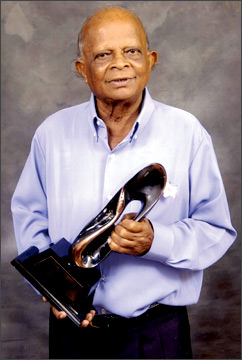 Four
decades of his life was dedicated to his muse. Music was the zeal of his
existence and his expertise spanned a variety of fields from songs,
theatre, and celluloid to the likes of opera. His legacy will be
treasured for years as a rare gift in the art stream of the country. Four
decades of his life was dedicated to his muse. Music was the zeal of his
existence and his expertise spanned a variety of fields from songs,
theatre, and celluloid to the likes of opera. His legacy will be
treasured for years as a rare gift in the art stream of the country.
Khemadasa led a simple life, caring a little about materialism and
health. He was often seen murmuring continuously until he got his melody
right. It may be ten times, and sometimes lapses over a hundred times.
He claimed to have had no formal education. However his creativity is
the emblem of years of hard effort, which even some qualified musicians
do not possess. His is not following the tradition, but attempting to
establish what is not traditional: bridging East and West.
This was a painstaking task for Master, which earned him both friends
and foes in the field. He was largely criticised to have condemned the
Eastern music and following Western music. There are times he is
verbally recorded to have condemned the Eastern music.
That is his philosophy, which he himself did not follow. He talked
high of Western instruments, but he had an abode for the Eastern
aesthete within himself. The Khemadasa musicology cannot be labelled as
either Eastern or Western; it is the superb blend of Eastern Ragas with
Western harmonies.
His experiment with musical styles around the world shared with the
local folk tunes, Hindustani rhythm, Western melodies and many other
forms of music combined together to make a unique form of style which he
could boast as his own.
|

Self portrayal
|
Life and times of
Master Khemadasa |
Full name : Guruge Premasiri Khemadasa
Perera
Born : 1937 January 25
Died : 2008 October 24
Place of Birth : Wadduwa - Thalpitiya
Schooling : Sri Sumangala College, Panadura, St. John
College, Panadura
Profession : Founded Sangitha Manjariya in 1958
Spouse : Somalatha Perera
Daughters : Anupa Khemadasa ,Gayathri Khemadasa
|
|
Award timeline
|
1966 Senasuma Kothenada Eksath Lanka Rasika
Sangamaya
1969 Golu Hadawatha Sarasavi and Radio Ceylon Magazine awards
1970 Narilatha Sarasavi award
1970 Mokada Vune Critic award
1973 Nidhanaya Critic award
1975 Ahas Gavva Critic award
1979 Bambaru Evith President’s award
1980 Vasanthe Davasak OCIC and President’s award
1982 Soldadu Unnehe President’s award (rejected)
1983 Vasanthathil Oru Vanavi OCIC award
1983 Ridee Nimnaya President’s award
1983 Sirith Virith State Drama Festival
1984 Thunveni Yamaya OCIC award
1985 Hima Kathara President’s award
1986 Yuganthaya OCIC and Sarasavi awards
1986 Makarakshaya State Drama Festival
1987 Maldeniye Simiyon OCIC award
1990 Sandakada Pahana Sarasavi award
1990 Siri Medura Sarasavi, OCIC and Swarna Sankha awards
1992 Dolosmahe Pahana Sarasavi award
1992 Madhu Samaya OCIC and Swarna Sankha awards
1994 Surabidena Swarna Sankha award
1995 Mee Haraka Swarna Sankha award
1996 Maruthaya Swarna Sankha award
1996 Dandubasnamanaya Sumathi tele award
1999 Julietge Bhoomikava OCIC and President’s award
2001 Rejana Sumathi tele award |
|
Essential reading
of Master |
Master, Sangita Yuga Yathrikaya A collection
of academic and creative articles written on Master Khemadasa,
followed by interesting details of Master’s life..
Compiled by Samantha Herath, Buddhadasa
Galappathi Lucien Bulathsinhala and Gamini Sumanasekara |
He took this form of music to the world, enthralling local and
foreign audience with his ballet, symphony, cantata and opera creations.
Folk poem and traditional ragas, he said, should not be used as they
are, but should be molded and modified to suit the contemporary setup.
This philosophy was the key to his achievements.
| Ballet |
Beri Sil
Kele Mal
Sitijaya |
| Symphony
|
Sinhala
Avurudda
Maha Muhuda
Niyagaya haa Vessa
Mage Kale Mavni |
| Opera |
Manasa
Vila
Dora Mandala
Sahasra Yathra
Agni |
| Cantata |
Pirinivan
Mangallaya
Nidan Mankollaya |
He maintained his own distinctive features in his music score from
Nandisena Cooray’s Sepatha Soya to Sanath Gunathilaka’s Ekamath Eka
Rataka, (which is to be released towards next year) outshining his
contemporaries. Jayantha Chandrasiri’s Dandubasnamanaya and Amarasiri
Peiris’ vocal of Balanna Nanda May Numbe Guhavai (look, Nanda, this is
your cave) in Jackson Anthony’s teleplay Esala Kaluwara are two examples
for Master’s influence from folklore.
The outstanding melody gave prominence to the voice of the vocalist
while minimising instrument contribution, conveying the theme of
impermanence. Many do not know that this master musician was himself
gifted with a melodious voice. He was a dab hand coaching the students
to perform their voices properly, with his own voice.
Everyone, as Master felt, is born with a talented voice, and it needs
to be trained. Although he did not directly admit, Buddhist philosophy
played a major role in every inch of his creativity. His much famous
cantata Pirinivan Mangallaya shows his influence from the oriental
philosophy. All his creations contained more or less oriental themes.
For him, Jataka stories had musical components, and Buddhist suttas have
the capacity to tremble the earth if delivered in a proper melodic
sense.
When he introduced these foreign styles, he was scoffed at primarily
for impossibility of grasping operas, symphonies, and cantatas. Music is
a universal language, which transcends the mortal verbal order. They are
not to be understood, but to be ‘felt’.
The Master had immense trust on words. If the wordings were
appealing, any poem or lyric will become a libretto for him. He would
consider it a treasure, though the Master claims the ownership of the
libretto afterwards.
“It’s a matter of converting textual order into a musical
interpretation. We should ‘feel’ the rhythm of words, and then only we
enjoy the musical interpretation,” he was once quoted as saying to a few
of his close associates.
“Once the musician started working on libretto, the librettist can no
longer claim any rights. It belongs to the musician. Libretto is
something, and score is something else. What you hear is the musician’s
composing, not the librettist’s.”
He was not just a Master, but he was full of humanism whom even the
kings could not buy. It was 1982, and he was awarded as the best music
director for Dharmasena Pathiraja’s Soldadu Unnehe. Cameras panned in
the direction of Master, who stood up at the announcement, and left the
premises rejecting the award, protesting against the unfair imprisonment
of Vijaya Kumaratunga.
Just as Opera, Cantata and Symphony, the word ‘Master’ is derived
from Maestro in Italian. The word is used in respect for the music
master. Khemadasa was the only ‘Master’ in Sri Lanka, which was not
dropped even after he was conferred with a honourary doctorate by Ruhuna
University. This epitomises Master’s stronghold as the unrivalled genius
of our time. He knew it well, and it was one of his weak points to
publicly leak out his self-pride with an occasional snobbish trait; that
was him, every genius has an Achilles’ heel.
Once a private television channel was scheduled to telecast an opera
theatre to mark the dawn of the millennium. All the arrangements were
complete for the massive opera theatre with the rehearsals drawing to a
close, when Master changed his mind at the eleventh hour, since
something did not please him.
He gave up the project, but later compiled his last CD containing the
untelecast opera theatre and Doramadalawa, one of his famous operas, and
titled it as Doramadalaven Dambaranvellata (from Doramadala to Golden
beach). Prof Sunanda Mahendra composed libretto for Dambaranwella
(originally titled Sahasra Yathra) while Lucien Bulathsinhala did for
Doramadalawa. His last creation was Agni Opera, libretto written by Eric
Illeapparachchi, to celebrate his seventieth birthday.
Age was not a barrier to this small-made septuagenarian though ill
health may have slowed his pace. He was jovial, always ready for a
hearty laugh, and sometimes seemingly drowsy at banquets probably due to
sleepless recording nights. He highly focused on creativity, until the
memory started fading gradually.
Death has no reason to be proud of in taking over the virtuoso. As
John Donne stated, it is but a short sleep, and the memory of this
beloved autocrat in his own hard-fought realm will remain eternal.
Farewell, dear Master...
Quotable quotes while Master was alive
Premasiri Khemadasa has succeeded in solving the dilemma that faces
all Asian artistes - how to exploit Western forms and techniques and
still preserve one’s own national identity - this is so in the novel, in
theatre, ballet, dance, music, painting, and even in architecture and so
on.
- Lester James Peries (Khemadasa composed music to some of Peries’
films like Nidhanaya)
*******
The Orchestration of the human voice as a musical instrument is an
achievement that displays the inventive efficiencies of a pure musical
genius.
- Dr W D Amaradeva (Sri Lanka’s master vocalist)
*******
In a country littered with self marketed cultural dilettantes and
desperados, Premasiri Khemadasa stands out with his remarkable talent,
uncompromising artistic integrity.
- Lakshman Joseph de Saram (A veteran flautist)
*******
The flirtation with western music is no mere bravura performance for
him. For Khemadasa genuinely believed that if we are to broaden our
aesthetic horizons, we should take our own music out to the wider world.
- The late Ajith Samaranayaka (Former Editor of Sunday Observer)
*******
Maestro Khemadasa is one musician who is ready to undertake the
socio-cultural context as his theme in musical interpretations.
- Prof. Sunanda Mahendra (Director of Master’s last stage play
Aesop)
*******
Although Khemadasa used western instruments, his melody well suited
the rhythm of my stage play Mahasara. I do not know whether this is
because this age-old legend portrays the traits of modernity.
Khemadasa’s music seemed to have highlighted the essence of my play.
(Translation)
- The late Prof. Ediriweera Sarachchandra (The foremost stage play
director to distinguish Master’s capacity)
*******
Khemadasa emphasised that one should not arrive at the conclusion
that he knows the whole subject, just because of little knowledge. Music
is a vast area studied widely in both Asia and Africa. It is a science.
(Translation)
- Lucien Bulathsinhala(Librettist of Doramadalava)
Dr. Khemadasa had the pioneer attempt to build up a music tradition.
He immensely had trust on folk music. (Translation)
- Nuwan Nayanajith(Critic of younger generation)
*******
It’s common seeing him dozing off while watching either a film or a
teleplay. However his evaluation turns out to be otherwise. He is
capable of analysing every single element. (Translation)
- Dr. Ariyaratne Atugala(Chairman, Sri Lanka Rupavahini
Corporation. Some of his teleplays had Master’s musical touch)
*******
The ocean is deep, the ocean is silent, full of deadly creatures… You
will hear the birdsong, you will feel the wind’s rhythm… O dear boatman,
Pedal your small boat… (Translation)
- Buddhadasa Galappatthi (Critic and poet)
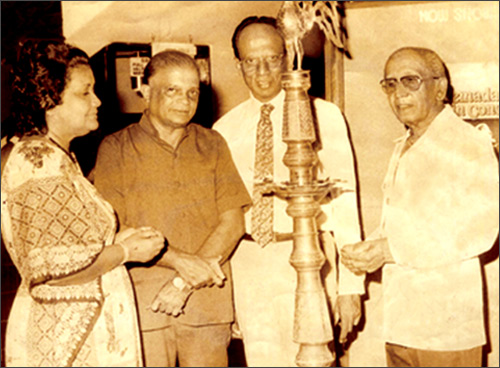
|
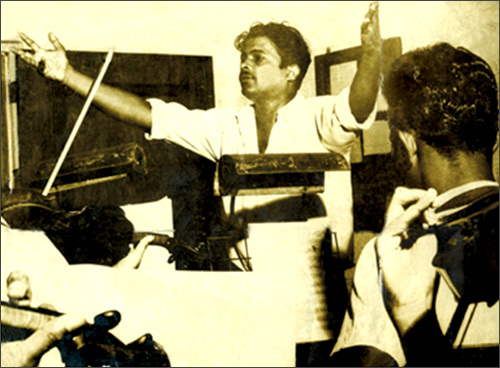
|
|
With Lester and Sumithra Peries |
Conducting an orchestra |
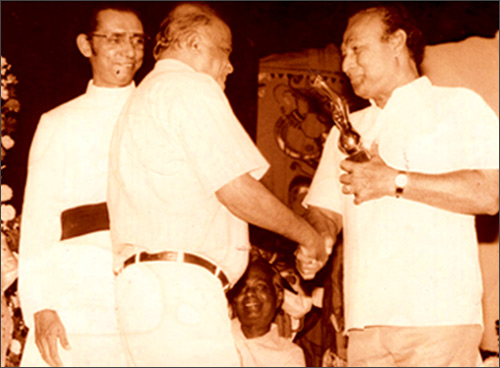
|
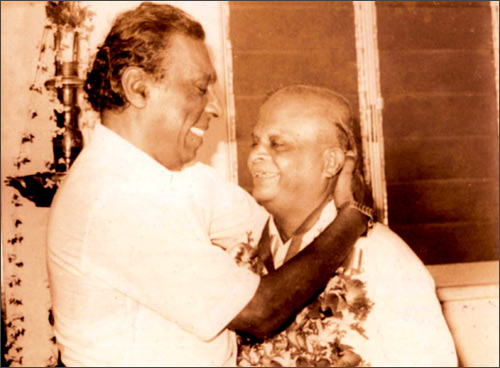
|
|
With Gamini Fonseka |
With Joe Abeywickrama |
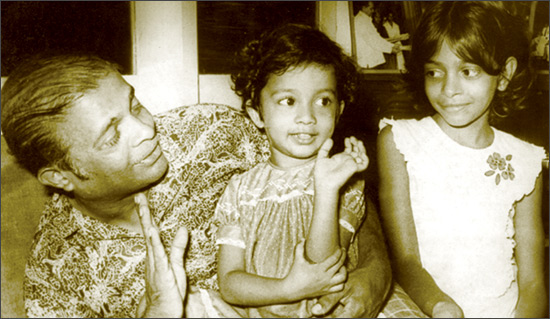 |
|
|
With two daughters |
Related articles:
|



